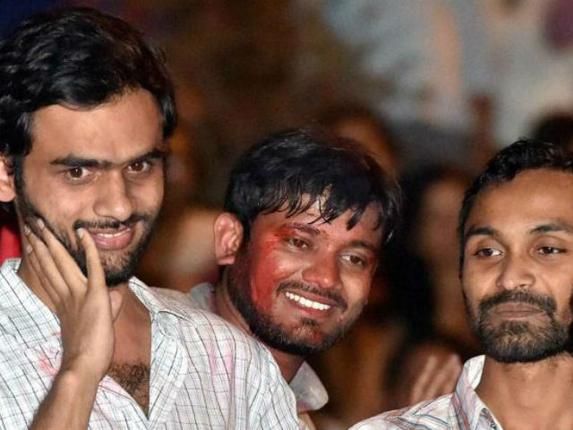 The Delhi high court on Tuesday sought response of Jawaharlal Nehru University on the pleas of two students, accused of sedition for a controversial event of February 9 in the varsity, challenging their rustication for varying duration.
The Delhi high court on Tuesday sought response of Jawaharlal Nehru University on the pleas of two students, accused of sedition for a controversial event of February 9 in the varsity, challenging their rustication for varying duration.
Based on the findings of a high-level inquiry committee, the university rusticated Umar Khalid for one semester and another student leader, Anirban Bhattacharya, till July 15.
Umar was slapped with a fine of Rs 20,000, while Anirban has been barred from the JNU campus for five years from July 23.
Justice Manmohan, while issuing notice to the JNU and seeking its response, also recorded the statement made by the varsity's lawyer that date of deposit of the fine by Umar shall be extended till May 30, the next date of hearing.
The judge refused to pass any other interim order, including staying of JNU's decision of April 25 as was sought by the petitioners, saying he will have to inspect the records to see whether proper procedure was followed by the varsity for holding the inquiry.
"Have to see the records to ascertain whether fair procedure was followed. You are pleading ignorance of all facts, so I have to see the record," Justice Manmohan said and directed the varsity to bring all the relevant records on the next date.
Advocate Akhil Sibal, appearing for Umar, argued before the court that his client was in hiding from February 11 to February 21 as he feared for his life subsequent to the events of February 9 and that he was in jail from February 23 to March 18 after he had surrendered.
Sibal said that the inquiry by the HLEC was carried out during this period, behind his client's back, and thereafter, when he was in prison, the varsity tried to serve a show cause notice on him on March 15.
The counsel for the JNU told the court that notices were sent thrice to Umar's known addresses, including that of his father, but he never appeared before the committee.
The counsel for Anirban also sought an interim relief from the court saying that the student was rusticated with immediate effect till July 15 and only has a small window of a week thereafter to submit his thesis, so he would be unable to consult his professors till July 15.
To this, the JNU lawyer said the rustication order was of April 25 and the student should have moved court much earlier.
She also said that under the rules an appeal is provided for against the order of the varsity.
To this, Sibal said that the appeal was to the vice chancellor who had passed the order in the first place, "so how can it be an appeal?"
During the arguments, Sibal also told the court that Khalid's lawyer had written to JNU's chief procter on March 18 asking for the report of HLEC, the material based on which the findings were arrived at and other details, but till date no response has been received.
As a result, Khalid neither had the show cause notice nor the report of HLEC, his lawyer told the court.
To this, JNU's lawyer said that the varsity had received the letter by Khalid's lawyer on March 21 and would be responding to it.
Sibal also told the court that if the fine was not paid, hostel services would be discontinued.
JNU students union president Kanhaiya Kumar, Umar and Anirban were arrested on the charge of sedition in February in connection with the controversial event and are out on bail.
The JNU had constituted a five-member HLEC to investigate the controversial event at the campus on February 9 and the panel had found some students guilty of violating disciplinary norms and disrupting communal harmony on the campus.








